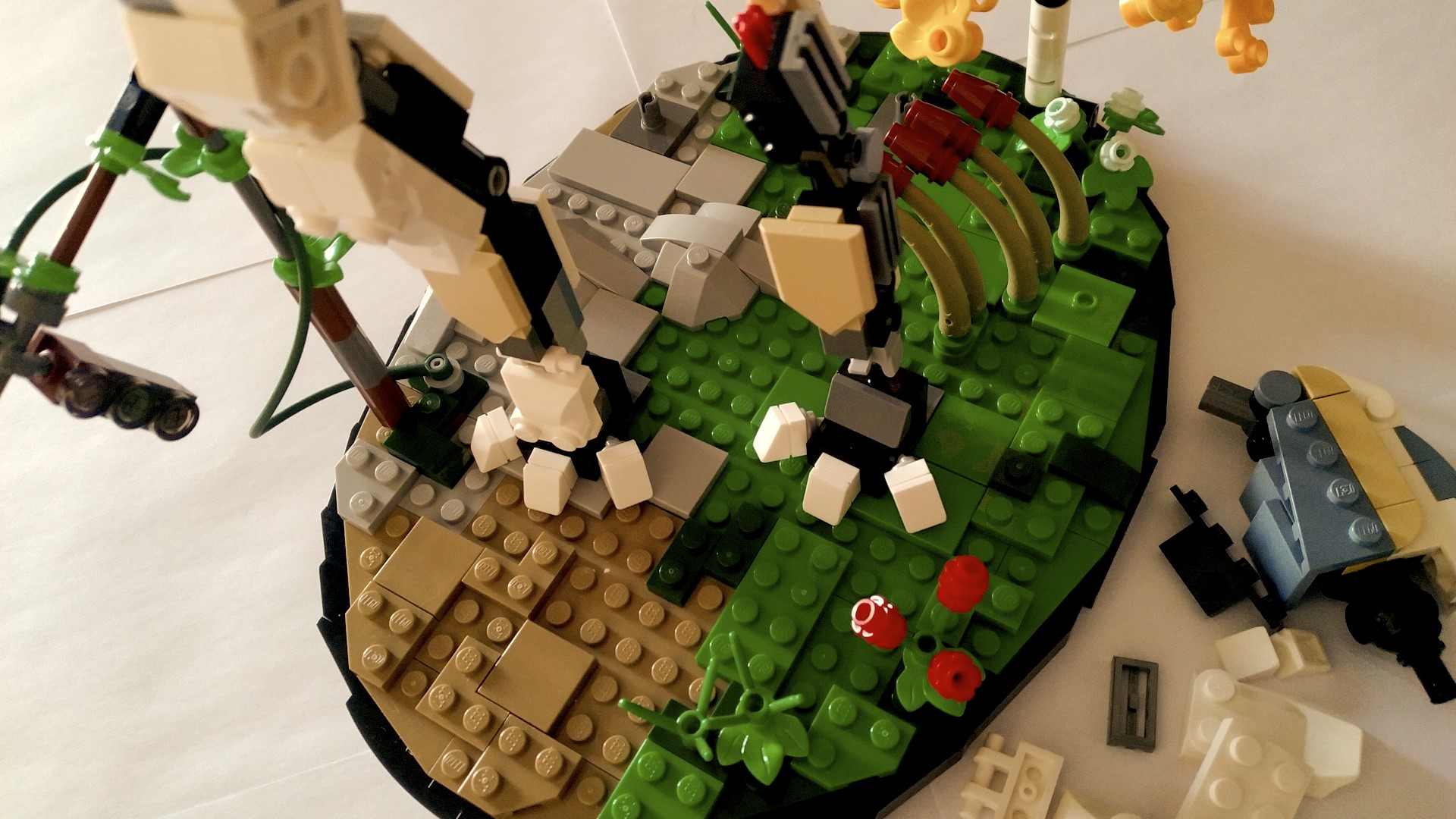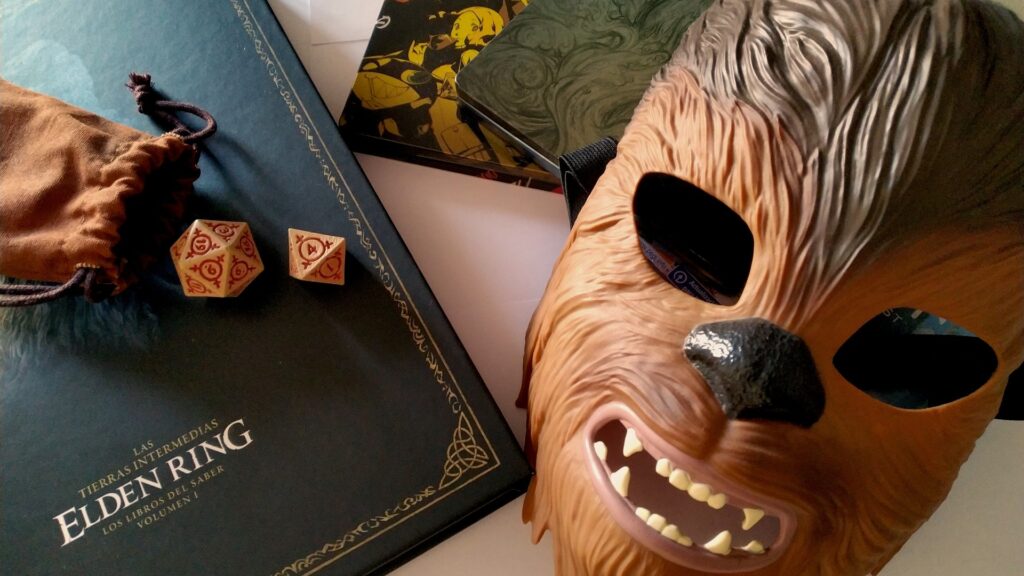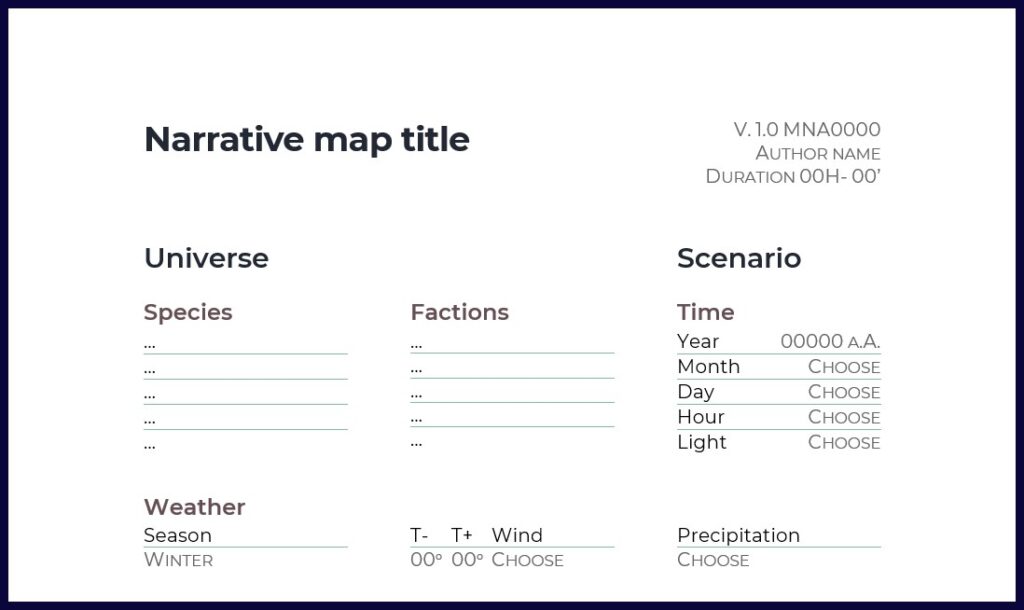- What is a role-playing game?
- How did role-playing games come about?
- Types of role-playing games
- Social Myths
- The benefits of role-playing games
- How to incorporate Them in the Classroom
- The Narrative Map as a Resource
What is a role-playing game?
To begin with, it is necessary to understand that role-playing games have several components that unite them, shaping them as we know them today. These components are:
- The social one, because it brings together a group of people who socialize and play interacting with each other.
- The psychological one, because it allows this group to understand other types of thoughts and behaviors through fictional characters.
- The simulation one, because all the members of the group will play one of these characters. In addition, they will represent actions and facts governed by game rules that will seek to represent the reality we know.
- And the narrative one, because all those actions and facts that the players will represent will narrate the life stories of their characters.
Taking this into account, many people have defined a role-playing game in their own way. Here are some of them.
«Role-playing is a unique, intimate, and powerful way to play. It allows us to create stories that are personal and yet universal. It’s a way to sit with friends and explore strange worlds and epic stories that never were.»
—Kai Poh
«A role-playing game is a system, defined by rules, in which players play characters within a fiction where conflicts exist and give rise to a story.»
—Zoldar
My definitions
Technical
«A role-playing game is a leisure experience in which one or several friends play or guide different characters that evolve throughout a fictional story.»
Colloquial
«If you enjoy your free time with your friends while dramatizing and improvising situations that some characters live throughout a fictional story under minimal rules, you are playing role-playing.»
—Abel Augusto Abelleira
But why are role-playing games defined in this way? Let’s try to answer this question by delving into the historical background that participated in their birth.
How did role-playing games come about?

Throughout history, different leisure activities have been carried out that can be seen today in almost any role-playing game. Most of them are always related to acting and theater, although others are more linked to other previous board games.
The English Wikipedia has a timeline with a lot of historical data that link each of the possible historical antecedents of role-playing games. Now you are going to understand why they are taken into account as such.
From 202 B.C. to 220 A.D. in China
The Han dynasty organized events for participants to pretend to be from an earlier era, similar to current historical recreations. In role-playing games, not only previous eras are represented, such as in medieval fantasy, but also possible futures in which science reigns, such as in the literary genre of science fiction. An example of a science fiction role-playing game that you probably know is Cyberpunk.
In Europe of the 16th century A.D.
In this era, itinerant groups of actors emerged. You probably know more about the Commedia dell’Arte. In this type of theatrical representation there were very marked characters with unique personalities. Each actor represented one of them, improvising satirical situations of social moments that were usually common at that time.
Role-playing games also have very marked characters with unique personalities, since each player plays one of them. These different personalities, which often can clash with each other, present an incredible opportunity to learn about other ways of thinking and behaving socially. And many times, prejudices towards other behaviors or ways of thinking prevent us from understanding their motivations, traumas, goals and real intentions.
This is where the role comes in where these fictional characters have to learn to understand each other, support each other and reach unanimous agreements so that the group can achieve its final goal within a role-playing game.
The parlor games of the 19th century
In addition to many of the board games that emerged at the beginning of the Victorian era, the parlour games appeared. The English and Americans who belonged to the middle or upper class played these games.
These were based on logic or word games. Helped by dramatic interpretations, physical exercise and other activities they had to solve certain logical tests to try to win. And surely, this type of parlor game was something similar to what we now know as Party & Co.
And they are also present in role-playing games. In many games puzzles, puzzles or puzzles are prepared that players have to solve. Thus, if they succeed, their characters can continue advancing through the story to achieve their goal.
The theatrical evolution between the 19th and 20th centuries
Viola Spin was a theatrical academic, educator and acting coach. His importance lies in having created theatrical games, today known as short scenes or sketches. The first theatrical game consisted of recreating a trial during a totally improvised scene. In it the actors and actresses had to reconstruct an open case to which they had to give sentence.
Within role-playing games this component is also present. On the one hand, the fictional stories of role-playing games usually have mysteries that players have to solve, like a kind of argument puzzle in which to find out what happened, how it happened and who was guilty.
Many of these role-playing games also present a villain to unmask and defeat. By doing so, the characters of the players will save those innocents who have been harmed under the yoke of the villain’s evil plans.
Creative history games of 1960
In this year a variant of historical recreations emerged that, as I wrote to you at the beginning, were already present since the Han dynasty of China. In this variant, people recreated famous historical battles or everyday situations, adding a touch of fantasy or historical mythology.
For the vast majority of role-playing games, fantasy and mythology are very present, giving them a great atmosphere. This allows players to live experiences in places and cities that they could never really visit.
Wargames as parents of role-playing games
We come to the last historical antecedent and from which role-playing games emerged. And it is that war games allowed to establish the combat system that many of the best-known role-playing games contain in their rules.
Several authors began to experiment with their own game systems. All the oldest versions of war games were variants of chess that incorporated new rules. This evolved in such a way that three types of war games coexisted: battles, skirmishes and duels.
Later, from 1954, a current of these games began to include certain rules of current role-playing games, such as social interaction between characters. Thus, around 1970 Blackmoor and Dungeons and Dragons were born that included this social interaction adding the structure and classic rules of role-playing games.
All the other historical antecedents that you have read are included in these two games and in almost all role-playing games:
- The representation of eras different from the current one.
- The interpretation of unique characters.
- The resolution of puzzles, puzzles and riddles.
- The inclusion of fantasy and mythology.
- And the combat rules of any wargame.
Are role-playing games important?
The answer would be yes. Because as you see, many of the characteristics of these games have been present in humanity for centuries. This makes role-playing games gather a lot of traditions and activities that have always taken place in different places on planet Earth, and all of them happened simultaneously.
So it could be said that role-playing games have enormous cultural importance, as they represent activities and games that people have been practicing for centuries.
Types of role-playing games

Over the years, role-playing games have had a constant evolution, with many new game systems emerging. But new formats and supports have also appeared that have become popular. This has made that today there are numerous video games that incorporate many of the characteristics present in any role-playing game.
The first clear example is that many video games that were of totally different genres have incorporated the entire progression and statistics system present in role-playing games. If we stop to think about the earliest example of all we could name Age of Empires, a real-time war game in which you can also manage your city as it evolves through different historical ages.
Another good example is Assassin’s Creed Origins, in which you travel with an assassin who learns and evolves throughout the story. The story is still its strongest asset, but for some reason everyone likes to see their character evolve and become much more powerful than it was. This saga changed genre, going from being an action and adventure game to becoming a role-playing game.
The same thing happened to God of War since the new installment of 2018. This game started out as a “hack and slash” in which you had to survive constant waves of enemies in order to advance in its plot. Today, like Assassin’s Creed, God of War has become a role-playing game. Kratos and Atreus must evolve over time.
As you can see, the components of role-playing games are very present in many current video games:
- In the social both games allow you to talk to friends about their story, tell them how you have lived it by playing it or theorize about the possible future of the saga.
- In the psychological you can see the actions taken by the characters, delve into their traumas and understand why they behave that way.
- In the simulation both establish rules to allow the character to also evolve in power, obtain new abilities and improve their equipment.
- And in the narrative they tell you how the characters advance through an important story that will change the world they know.
In addition, each of the characteristics present in historical antecedents are also found in these three examples.
The representation of eras different from the current one.
- In Age of Empires the historical eras of humanity.
- In Assissins Creed a possible future in which you can travel to historical eras.
- In God of War we visit historical eras in which mythology is part of reality itself.
Interpretation of unique characters.
- In Age of Empires the heroes you handle in campaign mode.
- In Assissins Creed to the protagonist and his alter ego from the past.
- In God of War to Kratos, and in new titles also to Atreus.
The resolution of puzzles, puzzles and riddles.
- In Age of Empires resource management itself.
- In Assissins Creed present in certain hidden places.
- In God of War present in specific places to achieve hidden treasures or open a new path to continue with the plot.
The inclusion of fantasy and mythology.
- In Age of Empires present in its Mythology title.
- In Assissins Creed with the science fiction created around the machine that used the first protagonist to be able to travel to the past.
- In God of War incorporated from its first title.
And the combat rules of any wargame.
- Age of Empires is a war game itself.
- Assissins Creed started as a stealth game that incorporated medieval duels.
- In God of War combat always abounded through performing combos, in the style of a fighting game.
Today you might ask yourself, what is not a role-playing game? But while it is true that many of these video games that I have named mix different genres, there is a categorization in itself for role-playing games themselves. I’m going to leave you links to Wikipedia, where each one of them is very well explained:
Each of these categories branches into subcategories. And in the case of tabletop role-playing games there are the following (although I may forget some).
With game master
This is how role-playing games were born, with someone acting as a conductor to guide the rest of the players along the story.
In this case, the game master is responsible for writing the story that is going to be played and for having the rules at hand in case any data needs to be consulted. It should also be specified that there are adventures already created by publishers and creators that can be purchased. Thus, all the game master has to do is read it and prepare what is necessary for the day the game is played.
Without game master
The players play their characters, but no one has that conductor role. These games allow greater improvisation to the group of players and completely discard all the preparation of an adventure.
One of the most well-known titles today is Fiasco, a role-playing game that allows players to represent characters in stories that are created at the decision of the players. Another modality is that the players establish what they want to do in the game of that day and play according to what is written on a single paper.
If you are interested you can read this article about the narrative map. In the templates that we give you there is one to play improvised games.
Without dice
As you are thinking, diceless role-playing games are played without using any kind of dice. Instead, and at least currently, most use cards so that players can use their characters’ abilities.
For one player
In this case, this type of role-playing games were created for people who wanted to play alone. Many times, the biggest problem with a tabletop role-playing game is that the group can meet one day, or even that the game master has enough time to create an adventure. This reason caused the birth of this type of variant. If you want to play role-playing games, you don’t know anyone to play with or you have the problem I mentioned, a role-playing game for a single player may be the solution you are looking for.
Here you have a very good video if you want to know a little more about role-playing video games.
Social Myths

The myths that have always surrounded role-playing games arose from some harsh news. Many of them sought to blame them for the events they narrated. However, the era in which they were born, the social situation that surrounded them, and the personal circumstances that may have existed must be taken into account.
Role-playing games were born in the United States in the 70s. During this time, drug use during parties was common, to the point of seeing it as normal behavior. On the other hand, believers and Christian religious customs were very restrictive with certain behaviors or social groups.
It should also be taken into account that family education in those years was very different. Two world wars had occurred, citizens were somewhat afraid, and parents wanted their children to study university careers. The latter, above all, to avoid that they could be called to enlist in case of a new war conflict.
These three factors were very decisive, and of course they influenced role-playing games a lot. In addition, teenagers had their own personal problems, their insecurities, they sought to fit into a group of friends and wanted to understand who they were. All in an era of constant changes and doubts about the Christian religion.
A tragedy occurs
One of the first news that sought to alarm society and discredit role-playing games was, according to this page, known as the steam tunnel incident. James Dallas Egbert was 16 years old and was already attending university, which meant carrying a huge pressure imposed by his parents.
On the other hand, Egbert was homosexual, and for this time it meant that he had to endure insults or beatings from many people. Apparently, this poor boy also took drugs in secret, probably derived from the difficult personal situation he had to live every day.
When he disappeared, a private investigator discovered that he occasionally played Dungeons & Dragons. Once they found him, the media emphasized that having played role-playing had caused his death. According to the website, the press blamed Dungeons & Dragons to protect the boy’s family’s reputation.
B.A.D.D. appears
Another boy died in 1982. In this case, the mother said that her son’s role character had been cursed, that this curse had been passed on to her son and that is why he had committed suicide. However, it is known that this boy idolized Hitler and had problems fitting in with his classmates.
The mother ended up forming B.A.D.D., a group that tried to censor Dungeons & Dragons. To do this they created modified articles telling how dangerous it was and asked for this game to have a warning label printed alleging that it could cause suicide. In addition, they sought by all means to ban the game in schools.
The myths
On page 415 of this monograph from the University of Salamanca, written by Rocío Tizón, the 7 myths that arose after both events are very well explained. This affected role-playing games a lot, being excluded from libraries and schools for decades.
The article begins by explaining that those who promoted the myths were influential leaders, both in politics and religion. And parents and educators who held them in high esteem followed their opinions spreading everything they said about role-playing games. The myths are as follows:
1 | The character and the player are the same person.
As stated in the article, role-playing gamers play a character just like an actor during a play or movie. But even so, it is not even as continuous as during the performance of a character during a play.
While an actor must stay in character for many continuous minutes, role-playing gamers do so only when it is their turn to speak. Even many times it is not even necessary to interpret, it is enough to explain the action that the character is going to carry out.
In addition, each of the historical antecedents that role-playing games have must be taken into account. All those practices that humanity has carried out for centuries imagining being another person have been unified in role-playing games. In general, humanity likes to play being another person, even to imitate them.
2 | Role-playing games teach players to cast spells.
By playing a fictional role, players can be a warrior, a musician or even a wizard. Many game rules include attributes that allow the character to use magic. All established so that the dice dictate if the character will cast a spell in the fictional story that is being narrated.
3 | In role-playing games there are winners and losers.
In a role-playing game the group of players always works elbow to elbow to achieve a common goal. In every game it is sought that the characters get to know each other to help each other. The group of characters can achieve the goal or fail in trying to achieve it.
Each character will have had their successes and failures, just as it would happen if they were in a novel, movie or play.
4 | Role-playing games glorify violence.
Role-playing games were born from war games, which evolved from classic chess. Therefore, both are strategy games that are played on a table facing miniatures that represent troops. In the practice of these games there is not an iota of violence, if not the throwing of many dice.
In addition, as mentioned in the article, role-playing games have a plot and every plot starts from a conflict that must be resolved. These conflicts can present physical, intellectual or social challenges that characters must overcome to achieve the goal. They may have to fight against enemies, dialogue to reach agreements or cook a stew to help another character recover from an illness.
5 | Role-playing games induce obsessive behaviors.
In this case, in the article it is commented that this statement comes from a generalization. There are people who can become obsessed with any person, hobby or social situation.
6 and 7 | Role-playing games turn people into criminals or induce suicide.
Unfortunately, some tragedies that occurred from the 70s were related to role-playing games. In some cases the implicated played occasionally and in others they were simply mentioned to hide the truth.
8 | Role-playing games are sexist. Only men play roles.
At the beginning of all this it was true. It was the seventies, women were still undervalued socially and did not have the same opportunities as men. And this happened both at work and in leisure and hobbies.
Today there are countless players, rule designers and editors in the publishing field of role-playing games.
9 | Role-playing games are childish.
Just as there is a categorization for books, movies and video games that establishes who can read, watch or play that title, in role-playing games the same thing happens. There are role-playing games only for adults, others for children and many that adapt to the player’s age.
Conclusions of the myths
Whenever something new appears, fear or ignorance tends to lead us to self-protection. It prevents someone from informing themselves to build their own criteria. In fact, you have surely rejected something that you did not know at first, just by hearing it or seeing it. It happens to anyone on a daily basis.
In its time, it happened to me with the music of the Baroque stage. I didn’t like listening to it at all, but after analyzing it in music analysis class I changed my mind. Now I understood what the composer wanted to tell me and I understood how the music of that period was constructed. Now I liked listening to it.
And something similar happened with role-playing games. People didn’t understand what their children were doing during role-playing games. And if something bad had happened to them, the blame could only be on role-playing games. Even though they didn’t know or understand them.
The benefits of role-playing games

Over the years there were people who wanted to answer the same question you have asked, are role-playing games dangerous? Up to this point, and with the data you have read, we could affirm that they are not. On the one hand, thanks to the historical antecedents that precede them, and on the other hand because the news that gave rise to the myths were manipulated.
However, there have been many scientific studies wanting to prove whether role-playing games were bad or quite the opposite. Thus many benefits were corroborated that are present in role-playing games and that help develop the following qualities in people.
Creativity and imagination
Today role-playing games have many game add-ons. The best known are maps, which help players visualize what places they will have to travel through.
But even with these visual aids, role-playing games force you to mentally construct the anatomy, clothing and gestures of all characters. You have to explain to the rest of your teammates how he acts and expresses himself. How he walks on the sand to pick up a wooden board that he liked and on which he will carve a figurine of an elephant.
The creativity of each player will help build events that will occur after carving the wooden figurine. Meanwhile, everyone’s imagination will be active to visualize how, after carving the figurine, another character lies down on a rock to breathe in the sea salt. And finally, the size, color, aroma and imperfections of that ship you are seeing docking on the shore of the beach. All happening at once as if it were a movie.
Decision making
Role-playing games force you to decide what your character will do. And these decisions can have consequences during the game. Thus, you learn to understand that making certain decisions can reward or punish your character.
And this is something fundamental to learn:
- To socialize with other people.
- To visualize the possible consequences that could fall on other people by making certain decisions.
- To be prudent.
- To give us time to meditate on what to do and not rush.
Decision making also helps speed up the mind to be faster when deciding correctly in certain situations.
The Responsibility
In a role-playing game you will always be part of a group. Therefore, your decisions fall on all those characters that make it up. Decision-making goes a step further and forces players to think about what to do in certain circumstances.
Characters do not have to be constantly forced to fight or put themselves in danger. They always have the option to talk about a problem and seek a peaceful solution that does not involve any risk for the characters in the story.
Teamwork
And returning to the topic of the group and decisions, team members must work side by side to achieve their goals. It is about mutually facilitating reaching the joint goal to arrive together at the end of the story.
Each character has a specific role. One will be better in combat, another in solving puzzles, and another in talking with others. And here it not only applies to the characters in the story but also to the players. Each of them will bring something different in each new game, which will make them unique.
Interpretation and Experimentation
On one hand, people who play role-playing games interpret their characters, which helps them experience a life they will never be able to live. They can travel to other worlds and imagine landscapes that would never exist. In addition to everything I have already mentioned above, like empathizing with other people to understand them better.
On the other hand, all this also allows scientific experiments to be carried out. Just like the typical role-playing exercises that are usually used to understand what happens in specific social contexts, role-playing games can also be taken to multiple scenarios to obtain different results.
Subjects and Basic Skills
Today many role-playing games are used as a teaching support tool. There are even teachers who have used their own role systems structuring their entire methodology.
And it’s not surprising since the rules of role-playing games, or even the students’ own imagination, help during the teaching-learning process. Thus they facilitate understanding mathematics, help express what they see in their drawings and encourage them to write about their characters and their stories.
There are also some psychologists or psychology groups that use adapted role-playing games as therapeutic tools. In these cases, they facilitate people with difficulty communicating socialize with other members of the therapy group. This helps them relate to others.
Many of the scientific investigations that you can find on the internet are paid for. However, I am going to leave you three websites where you can find many scientific studies about role-playing games.
And here are links to some chapters or scientific studies on role-playing games:
- ‘Death to the king!’: role-playing games and historical imagination in school.
- The role-playing game as a didactic strategy for the development of environmental awareness. A Design-Based Research.
- The tabletop role-playing game: the person and their relationship with the character.
- Exploring the Use of Role-playing Games in Education.
- Role-playing Games Used as Educational and Therapeutic Tools for Youth and Adults.
- Role-Playing Games: The State of Knowledge.
- The Fall and Rise of Role-Playing Games: From Societal Pariah to Psychological Support.
- The many faces of Tole-playing game studies.
- The role of expertise in playful learning activities: A design-based self-study within teacher education aimed at the development of tabletop role-playing games.
How to incorporate Them in the Classroom

In many of the scientific sources that you can visit above, there are studies of methodologies based on role-playing games. They usually give very positive results, especially in increasing student motivation during learning.
In this case, I am going to take as a reference Natxo Maté, a Spanish teacher who has implemented the role-playing game as a backbone tool of his entire methodology.
If you want to start with a role-playing game adapted for use in your classes, I recommend the role-playing game La torre de Salfumán, developed by Salvador Carrión and Sergio de la Cruz. I leave you here the page of their Verkami in case you want more information about the game.
I am also going to give you some simple guidelines so that you know where to start.
Narrative Motivates
One of the most important things for any gamified methodology is that it is backed by a good narrative. The story will provide some mystery and serve as a motivational springboard at the beginning of classes. In addition, students will want to unravel the mysteries that are presented to them throughout the story, constantly motivating them.
The good thing about this part is that it can serve both for individual subjects and for systems that relate them to each other, as happens to primary school teachers.
Group is Always Better
As any teacher and professor will know, small groups always work very well, especially for creative or scientific work. And in this case, it is no less. Divide students into groups, which can even be rotating. This will promote teamwork, understanding, and constant socialization of the entire classroom.
It’s the Process That Teaches
During classes structured with a role-playing game, it is very important for students to learn during the process. In this case, the final result takes a back seat. In fact, people who play role-playing games enjoy the process of the game and remember everything that happened to their characters during it. The goal is just an endpoint for the story they want to tell.
That’s why interactive jobs must be in line with the methodology. They will be the tool that all students will have to solve the mysteries that the story proposes to them.
Create a Reward System
For there to be another motivational engine, you must create a point system that can be exchanged for rewards. This is something very common in role-playing games. Characters gain experience by achieving their goals and use it to improve their skills.
In this case, each student must obtain rewards. You can create group and individual rewards. An example of a reward could be having an extra 10 minutes of recess. Another example, allowing them to bring a game they like to play at a specific time. This award will require the student to explain the game, so they would be working on socialization and public communication.
Challenge Them Intellectually
As you have already read, role-playing games also have a historical background in Parlour Games. Creating riddles and puzzles that they must solve in order to continue their work will allow you to add curricular content in a fun way.
They will be able to repeat mathematical exercises enjoying having solved them. Because the purpose of the riddle lies in solving that mystery that they want so much to discover… and of course in obtaining the coveted reward for achieving it.
With these small guidelines from Natxo Maté you can start developing a methodology structured by role-playing.
The Narrative Map as a Resource

If you have considered playing role-playing games and want a simple resource that speeds up the creation of adventures, in this article we give you more information about the narrative map. With it, you can create One Shots to play on a specific day or organize several as part of a multi-day role-playing campaign.
They are designed for you to add only the important information that will influence the plot of the story. They can be useful for playing with friends as well as for organizing role-playing sessions with students or patients in therapy.
Closing
As you can see, role-playing games carry a very broad cultural load, are present in many current video games, and have multiple educational and therapeutic benefits. In this sense, I hope you have been able to answer your question and feel like playing role-playing games. Because it is made for all kinds of people and is a bridge to better understand both ourselves and others.
Webgraphy and References
BrottBrottor. (March 17, 2016). Brottor’s Tavern. Retrieved May 13, 2021, from tabernadebrottor.com: https://www.tabernadebrottor.com/que-es-un-juego-de-rol/
Campbell, S. (2020). Quora. Retrieved May 15, 2021, from quora.com:
https://www.quora.com/What-is-the-origin-of-the-role-playing-game-Is-Dungeons-Dragons-the-first-iteration-or-were-people-playing-games-like-this-prior-to-D-D?share=1
Unknown. (September 12, 2017). Cornell University. Retrieved December 30, 2022, from blogs.cornell.edu:
https://blogs.cornell.edu/info2040/2017/09/12/the-role-of-emotions-in-game-theory-and-rationality/
Unknown. (January 19, 2020). Geek Native. Retrieved December 29, 2022, from geeknative.com:
https://www.geeknative.com/70753/why-emotion-is-the-new-frontier-for-ttrpgs/
Unknown. (n.d.). Wordnik. Retrieved May 13, 2021, from wordnik.com:
https://www.wordnik.com/words/role-playing%20game
Unknown, v. (March 23, 2021). Wikipedia. Retrieved May 13, 2021, from wikipedia.org:
https://en.wikipedia.org/wiki/Role-playing_game
Unknown, v. (May 14, 2021). Wikipedia. Retrieved May 14-15, 2021, from wikipedia.org: https://en.wikipedia.org/wiki/History_of_role-playing_games
Spain, I. R. (January 17, 2018). Real influencers. Retrieved January 09, 2023, from realinfluencers.es: https://www.realinfluencers.es/2018/01/17/receta-juegos-rol-educacion/
Espeso, P. (n.d.). Education 3.0. Retrieved January 04, 2023, from educaciontrespuntocero.com: https://www.educaciontrespuntocero.com/recursos/juegos-de-rol-en-educacion-beneficios/
Espeso, P. (n.d.). Education 3.0. Retrieved January 04, 2023, from educaciontrespuntocero.com: https://www.educaciontrespuntocero.com/recursos/plantear-juego-rol-aula/
Fluhr, D. (January 31, 2014). Role and narrative. Retrieved May 17, 2021, from rolrock.wordpress.com: https://rolrock.wordpress.com/2014/01/31/historia-de-los-juegos-de-rol/
Functional Nerds. (March 27, 2013). Retrieved May 15, 2021, from functionalnerds.com: http://functionalnerds.com/2013/03/history-of-role-playing-games/
Olson, C. (2018). Quora. Retrieved May 13, 2021, from quora.com:
https://www.quora.com/What-are-Role-playing-games
Petersen, J. (January 30, 2021). Info Bloom. Retrieved May 13, 2021, from infobloom.com: https://www.infobloom.com/what-are-role-playing-games.htm
Poh, K. (October 3, 2016). Role over play dead. Retrieved May 13, 2021, from roleoverplaydead.com:
https://roleoverplaydead.com/what-is-tabletop-roleplaying-game/
Tizón, R. (November of 2010). Myths and legends about role-playing games. (J.P Orejudo González Ed.) Educational and cultural perspective of “role-playing game”. Journal of Education Theory: Education and Culture in the Information Society ,11(3),440 .Retrieved August17 ,2023 from usal.es https://gredos.usal.es/bitstream/handle/10366/100592/Monografico_completo.pdf;sequence=1
Zoldar .(October2 ,2020) .1d12 monkeys .Retrieved May13 ,2021 ,from1d12monos .com: https://1d12monos.com/que-es-un-juego-de-rol-parte-1/
Zoldar .(October9 ,2020) .1d12 monkeys .Retrieved May13 ,2021 ,from1d12monos .com: https://1d12monos.com/que-es-un-juego-de-rol-parte-2/